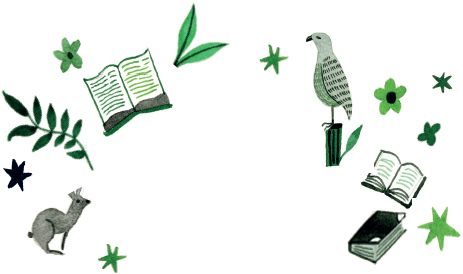THE
STORY
PRINCESS
Once upon a time, on a misty, rain-swept island, there was a castle.
It was splendid, with turrets and towers, moats and battlements, gardens and ballrooms, and the princes and princesses who lived there were equally splendid. Each had a particular talent. Prince Ruaríg was a champion swimmer who had once rescued the king’s favorite dog from drowning; Princess Fionnula’s singing made her famous all over the country; Princess Aoife was a fearless horse rider; Prince Pádraig’s dancing was exquisite; and, at the age of ten, Prince Connor could shoot an arrow straight and true.
Only Princess Saoirse was different.
Saoirse sang like a frog, danced like a goat, had never learned to swim, and was afraid of animals. The one time she had tried to shoot an arrow, everyone had laughed because she almost killed the cat, and she had sulked for days.
“Why am I so strange?” she asked her mother one day.
“You’re not strange, darling!” the queen protested. “You’re different.”
“I am strange,” Saoirse retorted. “Everybody says so. Yesterday, one of your ladies called me an ‘odd little thing,’ and another one said, ‘yes, what a shame, when the others are so marvelous.’ I heard them. I was hiding in the hedge when they were walking in the garden. I hate it when they compare me to the others!”
“You shouldn’t eavesdrop,” said the queen. “And what were you hiding from?”
“Everything,” said Saoirse.
The queen’s heart bled for her daughter. Hiding in hedges! she wrote to her own mother. She is a bit odd . . . but, Mama, I think she is also lonely. Please will you come to visit, and try to talk to her? You are so wise, I am sure you will know exactly what to say.
The old queen was indeed wise. So wise, in fact, that when she came she did not try to talk to her granddaughter at all. Instead, she gave her a book.
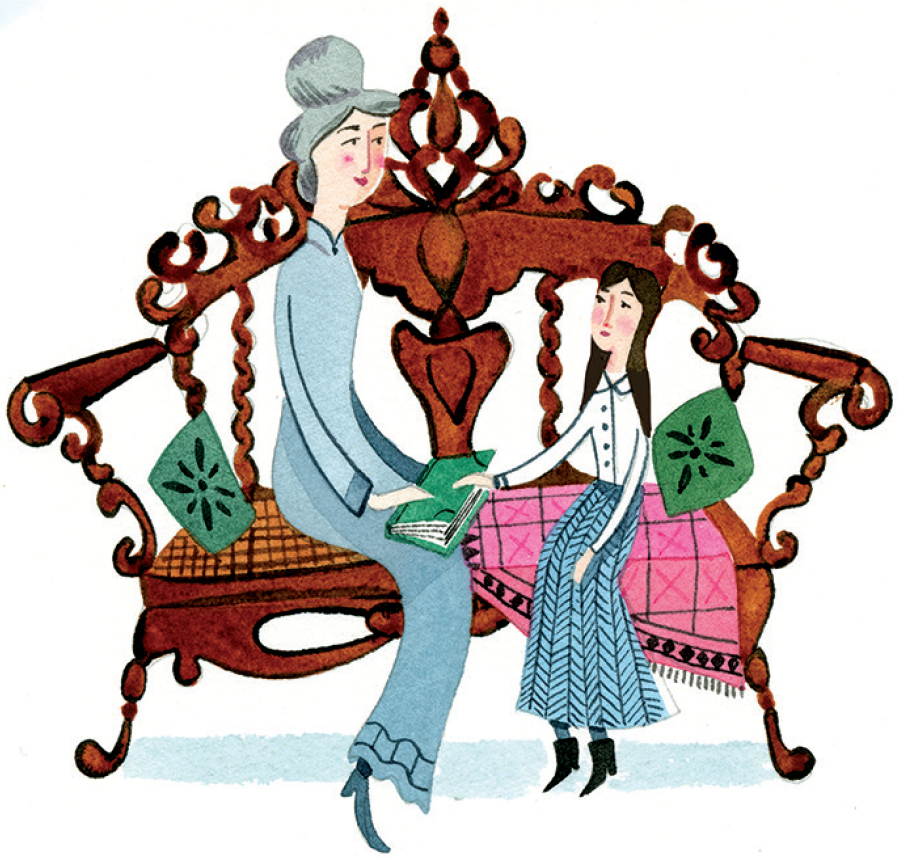
“Why?” asked Saoirse.
“If you prefer,” her grandmother replied, “we can watch Connor practice his archery.”
Saoirse opened the book.
As the hare runs fleet and the hawk flies true
I will find my way to you
Before the strike of twelve
Before the closing of the gate
I will bring you home
Rose came into this world on a crisp spring morning, as farmhands drove cattle back to the fields from milking and the school bell in the village started to ring. After the birth, the midwife turned her back on mother and baby for less than a minute and went to the window. The ground lurched as she pushed it open, and for a moment the world was thick with mist. The midwife wondered confusedly if there might be an earthquake. But when she looked out of the window she saw only order and loveliness. A robin sang from a branch of the old oak tree in the garden, a ring of tiny white cyclamen grew at its foot. From the lane, she heard children laughing on their way to school, and she smiled at the thought that, one day, the new baby would walk that same path.
All this the midwife noticed, yet it did not strike her as strange that, though the day was still, the leaves of the oak tree shook as if a storm was blowing. She did not hear the scurrying footsteps, the thud as something small and round slipped through a gap in the floorboards. And when she turned back to the white-green baby in the cot, she forgot that the baby she had laid there only moments before had been plump and pink.
Even the mother forgot.
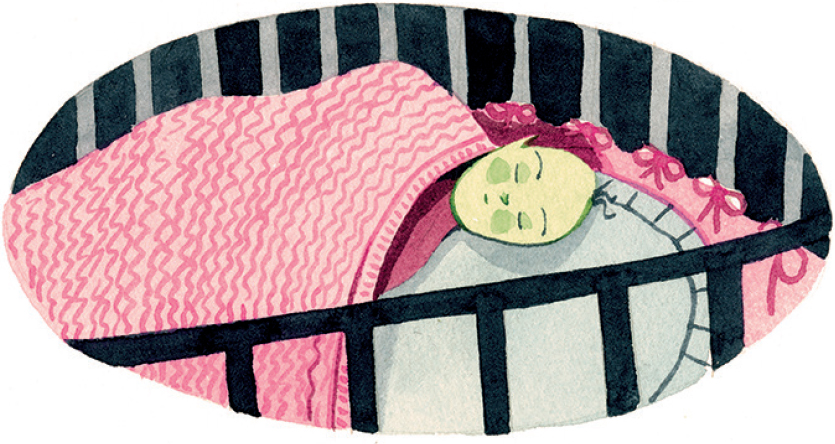
It was as if a spell had been cast.
Francis and Eileen, the parents, loved the child with all their hearts. They were honest farmers who went to the local market every week and to the town fair twice a year. Otherwise they lived quietly in their old farmhouse on the edge of the village. Which was just as well, because after Rose arrived, their neighbors kept away.
“Strange . . . ” whispered the ironmonger’s wife, when she saw the white-green baby.
“Creepy,” said the baker. “I’ll not be letting my children near her.”
“In the old days,” said the mayor’s housekeeper, “they would say she was not of this world. They would have left her in the forest to fend for herself . . . ”
A child left in the forest meant a child eaten by wolves. Everyone knew that.
No one said, “Thank goodness those days are over.”
The years passed and the neighbors’ disapproval grew.
“Her clothes!” they whispered, whenever Rose passed. “Dear me, her clothes!”
It wasn’t that Rose’s clothes were different. Eileen dressed her in exactly the same plain, hard-wearing dresses as all the village girls. Yet as soon as Rose put them on, the itchy pinafores and stiff aprons that hung so heavy on others became airy as silk, swirling and billowing like something alive. Her parents thought this was beautiful, but the neighbors knew it wasn’t right, just as Rose’s silver eyes weren’t right, or her wild black hair that no ribbon could hold. As for the way she behaved! Who could forget Rose’s first morning at school, when instead of playing with the other children, she had climbed right to the top of the rowan tree by the gate? She had stayed there all day. When asked why, she said she was keeping company with a robin.
A robin! And how had a child so small even gotten into the tree, let alone to the top?

There were always so many questions about Rose, and always so few answers. . . .
Her classmates made up a song about her, and no wonder, the neighbors muttered. It wasn’t a nice song—but then, they muttered, Rose wasn’t a nice child.
A few days before Rose’s twelfth birthday, their disapproval reached new heights. A crowd had gathered to gossip in the square, where Rose in rippling tweed lay on the wall of the mayor’s paddock, ignoring them and singing to his horse with her hair full of straw.
“I heard she is sleeping outside,” the mayor’s housekeeper whispered. “In a haystack! Like a rat!”
“But whatever for?” cried the ironmonger’s wife.
“She has”—the mayor’s housekeeper lowered her voice even further—“dreams!”
“Dreams?”
“Bad dreams, Eileen says, if she sleeps in a bed. Scary dreams. I ask you! Eileen should send the girl away.”
“Oh, yes,” said the ironmonger’s wife and the baker and several others, smug because their daughters did not flaunt their clothes, or sing to animals, or sleep in haystacks, or dream. “Eileen should send her away.”
No one mentioned the wolves, but they were all thinking of them.

“As the hare runs fleet and the hawk flies true
I will find my way to you.”
Rose pulled the horse’s ears as she sang. She liked horses. They were not as quick as birds or as clever as foxes, but their solid strength was soothing, and after last night she needed to be soothed.
For as long as she could remember, there had been only one dream. A forest, cool and dark, though bright with flowers where the light broke through. Loud with birdsong, alive with animals and—people.
People who looked like her.
They slept in trees, the people in her dreams. Foraged for nuts and berries, drank from streams, hunted with knives and arrows. They were tough and fierce, always running and climbing. Rose thought they must be at war, because though she never saw them fight, she often dreamed of them returning, bloody and battered, to the forest. But, oh, the wild freedom when at night, around their fires, they set aside their troubles and began to dance and sing! And the ease with which they moved among the treetops—leaping from branch to branch as if they were flying! Just thinking about it took Rose’s breath away.
Sometimes, waking up was more than she could bear.

Rose had not been entirely truthful with Eileen about why she wanted to sleep outside. It wasn’t that her dreams were scary. It was more that they were so big she felt they might tear down the walls.
“Sometimes,” she whispered to the horse, “when I’m inside, I can’t breathe.”
The horse tossed its head.
“Poor dear,” she said. “You probably feel like that every time they put the bit in your mouth.”
The horse sighed. Rose dropped a kiss on its nose. A group of girls passing began to chant.
“Changeling, witch, goblin child
Dirty, stupid, ugly, wild.”

It was the song they had made up about her at school on the first day, the song that followed her everywhere. Rose bit her lip and ignored them.
In yesterday’s dream, dancers had spun through flames to the sound of drums, while singers held hands in a circle around the blazing fires, singing of love and life and death. When Rose awoke, her pillow was wet with tears.
“There’s a girl in my dreams,” she whispered to the horse. “She’s different from them, like I’m different here, all pink and white, with soft straight hair. She tries to keep up with them, but she slows them down, and I don’t think they like it. There’s a woman who cares for her who always seems sad. They’re looking for something, these two, all the time—they search every tree trunk, every stone, every inch of forest floor. Usually the others ignore them, but last night . . . ”
Last night, some of the forest people had threatened the girl and the woman. Rose didn’t know what they had said. She only knew that even though the girl had cried and the woman had pleaded, the forest people had turned their backs on them. Afterward, the woman had held the girl and sang to her, the song that Rose was singing now.
The song she always sang.
“As the hare runs fleet and the hawk flies true . . . ”
A gaggle of boys approached, waving sticks. Rose braced herself for their sneers, then frowned as they passed without comment. Something was wrong—the boys always laughed at her. She sat up, craning to listen—heard shouts, laughter, and something else . . .
Rose swung her legs over the wall, floated to the ground, and ran across the square to the front of the crowd. A dog cowered in the middle of the tight circle, a one-eared stray bitch Rose knew well, the mother of six eight-week-old puppies. Her jaw was locked onto a shoulder of lamb stolen from a kitchen, and she was growling as the boys jabbed her with their sticks.
“Let it go, thief!”
The bitch whimpered as a blow caught her on the side of the head, but she did not let go.
Rose cried out. The bitch, sensing an ally, dashed toward her and cowered against her legs. Rose reached down to pat her.
“Get out of the way, freak,” growled Thom, the oldest boy.
“I won’t!”
“I’ll beat you if you don’t!”
“Go on, then!”
“Changeling, witch, goblin child
Dirty, stupid, ugly, wild.”
It happened very fast. One moment, the boys were circling Rose, jeering. The next, they were spinning out of control, faster and faster, until their feet were off the ground—as if they were flying, people said. Then, suddenly, they stopped and fell. Thom broke his collarbone, another boy broke his wrist, two others suffered concussions, and everyone said Rose had done it.
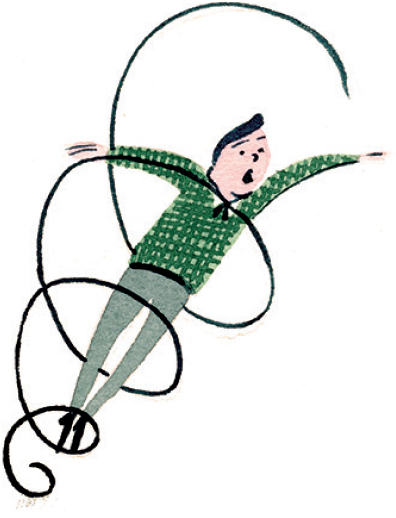
The next day, Francis and Eileen received a visit from the mayor.
“But how could Rose have done it?” cried Eileen.
“One small girl against four strong lads!” agreed her husband. “It’s not possible!”
And yet, the mayor said, the lads were injured and the girl was not.
“There is a place in town,” he added.
“What sort of place?” asked Eileen.
“A school.”
“But Rose goes to school here!”
“A good place for girls like her,” the mayor plowed on. “Where they’ll teach Rose right from wrong and drive wild thoughts from her head. She’ll come back a changed girl.”
Eileen thought of the only time she had taken Rose to town, how she had hated it—the clatter of metal cart wheels on stone streets, blinkered horses, and every tree or patch of grass hemmed by walls or railings.

“But we don’t want her changed,” she whispered. “We love her as she is.”
“They are calling her a witch,” said the mayor.
“Dirty, ugly, stupid, wild . . . ”
In her head, Eileen heard the howl of wolves. She knew what people did to witches.

Rose watched them come for her from the window of her parents’ bedroom, on the morning of her birthday, as farmhands drove cattle back to the fields from milking and the school bell rang. The mayor and the women from the town school came in a cart; villagers followed on foot. The women from town wore black and looked like crows.
Her parents were waiting by the gate. Francis had his arm around Eileen. Rose felt her eyes prickle.
The cart stopped. The mayor glanced up as he climbed down. Rose dropped out of sight and curled into a ball on the floor behind the curtain.
“Rose!” Francis, trying to sound brave. “Rose, love, it’s time!”
Rose ran her fingers along a gap in the floorboards and wished that she could hide there.
“Rose, come down!”
There was something lodged between the boards, something shiny. The gap was wide enough for her little finger. She hooked it through a scrap of ribbon and tugged.
The something shiny was a mirror compact, gold and etched with flowers, quite out of place in the farmhouse. What was it doing there? Rose ran her fingers over it, then pressed the clasp on its side. . . .
The ground lurched and she dropped the mirror. The window blew open and the world disappeared in a thick white mist. Rose scrambled to her feet and fought back a scream.
The pink-and-white girl from her dreams was standing before her.
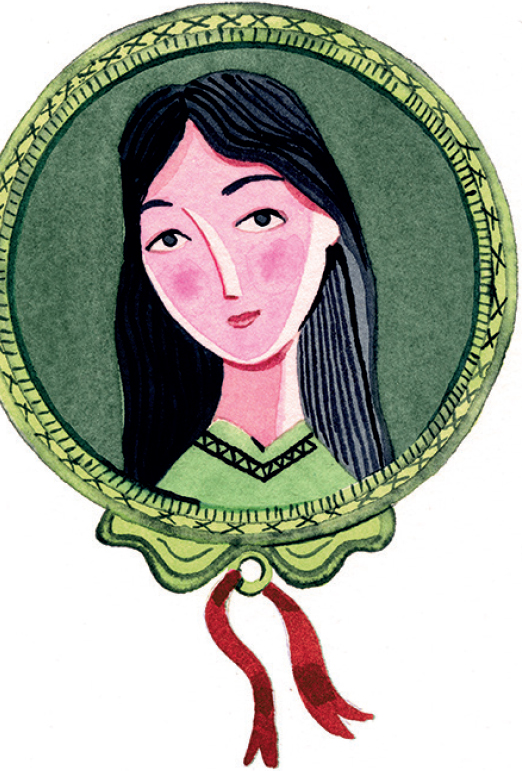
For a few seconds, all either girl could do was stare. Then the girl from Rose’s dreams rushed forward to grasp her hands.
“It’s you! Oh, it is you! But how did you do it?”
Rose swallowed. “Do what?”
“How did you open the portal?”
“I . . . looked in a mirror?”
“A mirror! Clever Aisling! Oh, I’m so happy to see you!”
Despite her astonishment, Rose felt a glow of pleasure. She couldn’t remember anyone apart from her parents ever being happy to see her. Except . . .
“My name’s not Aisling.”
“Why, what do they call you here? Rose? That’s a terrible name for you! Though perfect for me! Oh, now you look confused. I’ll explain, but quickly! We—you and I—we were born at the same time, exactly twelve years ago. Me here, you in the forest realm. But there was a war in the forest, so the midwife who delivered you hid you here, to keep you safe, because you’re a princess . . . ”
“A princess?”
“ . . . and they wanted to kidnap you. Oh, there’s no time for this! The midwife who hid you was killed before she could explain how her portal worked, but the point is portals only last twelve years and today . . . ”
“Today is our birthday,” Rose said slowly. “Before the strike of twelve . . . ”

“Before the closing of the gate . . . You know the song! Your mother sings it all the time.”
“The woman in my dream is my mother?”
“She’s never stopped searching for you. Aisling, you will go back, won’t you? The forest people, they’re good people, but I slow them down and after the portal closes, some of them want to leave me in the forest, and there are wolves . . . ”
Something was happening. The white mist was thinning, the room coming back into focus. Outside the door, Aisling (she was Aisling, she knew it) heard footsteps.
“There are wolves here too,” she said. “Human wolves, and human crows. Are you afraid?”
“No!” said Rose (she was Rose, just as Aisling was Aisling). “Are you afraid of the war?”
“I don’t think so,” said Aisling.
“Love, it’s time!” Eileen was on the landing. For a wild moment, all Aisling wanted was to run into her arms. But then, outside, the village children took up their chant. . . .
“Changeling, witch, goblin child . . . ”
“Aisling!” Rose was fading with the mist. “The mirror! We’re running out of time. The mirror is the portal. Pick it up and bring it here—let’s hold it together. . . . ”
The girls clasped their fingers around the mirror and held their breath.
Nothing happened.
“Close your eyes!” urged Rose. “Wish!”
The chanting grew louder, the door handle turned, and suddenly . . .
Aisling knew what she must do.


She let go of Rose’s hand, let go of the mirror. As the door opened, she jumped onto the sill. As Eileen, Francis, and the mayor entered the room, she spread her arms . . .
. . . and flew.

The mirror glowed. The ground lurched, the world filled with mist. Eileen, bursting into the room, wondered about earthquakes, but when the mist cleared and the ground leveled, she saw only order and loveliness. A robin sang in the old oak tree, and a ring of tiny white cyclamen grew at its foot, while outside in the lane children laughed on their way to school.
“Happy birthday, love!” Eileen hugged her pink-and-white daughter close. “Twelve years old already! Where does the time go? Now hurry or you’ll be late for school!”
The mayor returned to the village, the crows went back to town. The children forgot their wicked song about the white-green girl.
Everyone forgot. Well, almost everyone.
The real Rose kept the mirror always, all through her long and happy life. She liked to peep at it from time to time, to see how Aisling was getting on.
Whenever she did, Aisling was always running or climbing or dancing.

It was dark by the time Saoirse finished reading. She closed the book, placed it on the table beside her, and stared thoughtfully at the fire.
“Well?” asked her grandmother. “What did you think?”
“I didn’t like the way people treated them,” said Saoirse. “They were mean. It wasn’t Aisling or Rose’s fault they were different.”
“The world is not kind to those it does not understand,” agreed her grandmother. “But they found a place where someone understood them, didn’t they?”
“I know what you’re doing,” grumbled Saoirse. “Any minute now you’re going to say I’m not strange, I’m different. But the point is, I am not a changeling. I can’t go and live in the forest. There is nowhere for me to go but this castle.”
“But there is.” Her grandmother tapped the book on the table between them. “Don’t you see? You have been there already.”
It was only much later, as she reached for the book again in bed, that the old queen’s meaning became clear to Saoirse. She was looking forward to reading the next story, as she imagined looking forward to seeing a friend. And the book was a friend, she decided. Hadn’t she run through the forest with Aisling who was Rose, and climbed trees and sung to horses with Rose who was Aisling? Their hearts had beaten in time, her lips had silently mouthed their songs. She had never felt so completely understood as when she was reading their story.
“Maybe,” she whispered to herself, “that is what stories do.” And then, louder, “The princess who reads stories. That is what I will be. No, not just the princess who reads. The princess who collects stories, and listens to stories, and tells stories. I will be the Story Princess.”
Saoirse opened the book and began to read. She never even noticed when something small and shiny slipped from between the pages and fell with a quiet thud through a gap in the floorboards. . . .

